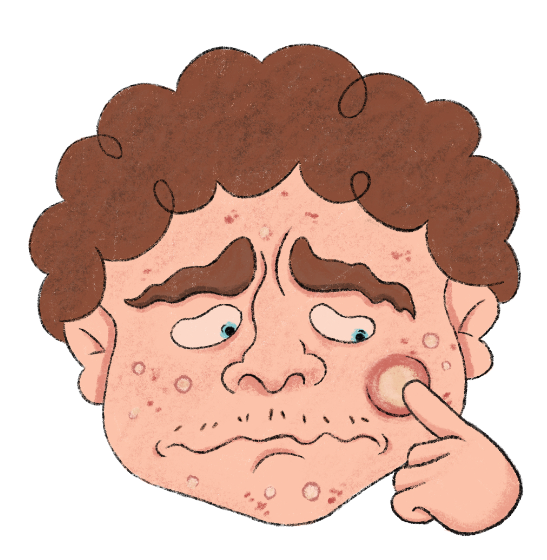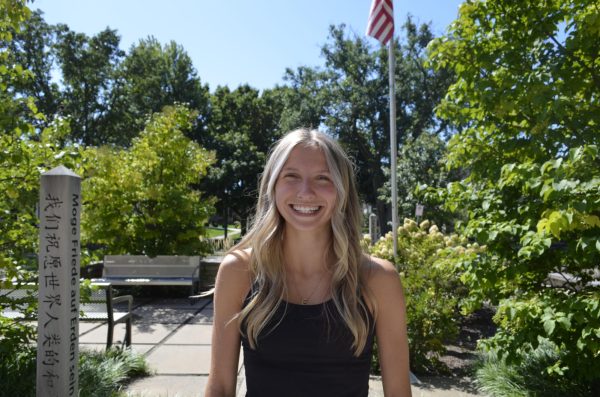Students face many challenges throughout their four years of high school. Being a teenager is hard enough with physical and mental pressures from school, extracurriculars, and social lives, but there is an overlooked additive to these stressors: acne.
“We see a lot of high school teenagers with acne; its the most common visit we see with high school age folks. It can be challenging, and our experience is that it’s a natural phenomenon when hormones increases oil production that increases acne,” dermatologist Dr. Michael Schowalter said.
Acne is a normal part of almost everyone’s life at one point or another, but many are not aware of how deep rooted the affects are on one’s primitive years. Not only are the spots painful, but hard to conceal, especially in extreme cases.
“So much of high school is social interaction, and if you have acne it can be detrimental to how you feel about your presentation to yourself to the world,” Dr. Schowalter said.
Students are simply more susceptible to certain types of acne because of how they live their day-to-day lives. Involvement in sports and extracurricular activities can be a factor in the degree of a student’s acne.
“There’s a subset of acne called ‘acne mechanica’ which, for instance, when someone is in sports they might have to wear protective helmets, so the sweat and dirt can further exacerbate acne,” Dr. Schowalter said.
Stress is another driving factor in breakouts and skin problems. Long nights of studying or early morning wake-ups stacked on top of whatever else a student is involved in naturally causes a large amount of stress.
“When you are stressed there is a rise in the stress hormone cortisol which increases oil production even more and along with stress comes with the natural pressures of being in high school so you don’t have a lot of time for yourself. You’re doing a lot of sports or going here and there so skin care routines can kind of suffer,” Dr. Schowalter said.
After acne is prevalent for an extended period of time, people are more likely to experience long-term effects that could potentially alter their skin as they become adults.
“Acne is not just the pimples and the acute lesions which can lead to scarring and dark marks which can also be damaging to confidence as well. We want kids to come in and treat it as early as possible to avoid the scarring and the long-term consequences,” Dr. Schowalter said.
Along with the stress of trying to avoid acne and its effects, the mental toll acne imposes is often left unnoticed as well. Confidence, motivation, and overall mental well-being can be disrupted due to prevalent skin issues.
“I believe acne and overall appearance affects teens tremendously. It affects more than the skin- acne can impact a teen that leads them to feelings of self consciousness, lower self esteem, anxiety, depression and social withdrawal,” counselor Cynthia Karmik said. “Teens are sensitive to their appearance because this is a time and developmental stage where social connections are, and feel, crucial.”
As difficult and isolating as the mental aspect of acne may feel, it’s important to know that nobody is alone, and most have gone through their own acne journey at one point or another.
“Almost everyone goes through some degree of acne because its a natural biological phenomenon. If you’ve never had acne you’re in the small majority of people that are lucky. It’s also important to know that almost everyone outgrows it at some point once the hormones in your body go back to normal,” Dr. Schowalter said.
Methods to treat acne range from a variety topical creams, dietary supplements, and prescription drugs. Every case is unique, and there’s no “right” way to go about treating acne; it truly depends on what works best for that person.
“I got acne in sixth grade and it was pretty bad throughout middle school and freshman year. I got a prescription that didn’t work. Last year it wasn’t as bad but I finally got a medicine this summer that has really helped,” senior Layla Carter said. “Acne made me less confident. I always felt like I had to wear more makeup.”
Mentally supporting yourself and others is just as important as physically healing acne. There are countless ways to de-stress and heal your mind if acne is a stressing factor in your life.
“Either with friends, family, a doctor, or your counselor; talking can help process the emotions surrounding acne and mental health. Don’t hide acne, maybe try wearing no makeup. Although challenging, this can help support strengthening your self confidence,” Karmik said. “Take a break from social media. Social media can often worsen body image concerns. Practice positive affirmations and self care including exercise, meditation, and deep breathing.”






Jennifer Russotiesi • Jan 30, 2025 at 8:40 am
Love seeing your writing published! XOXO Mamma 🙂